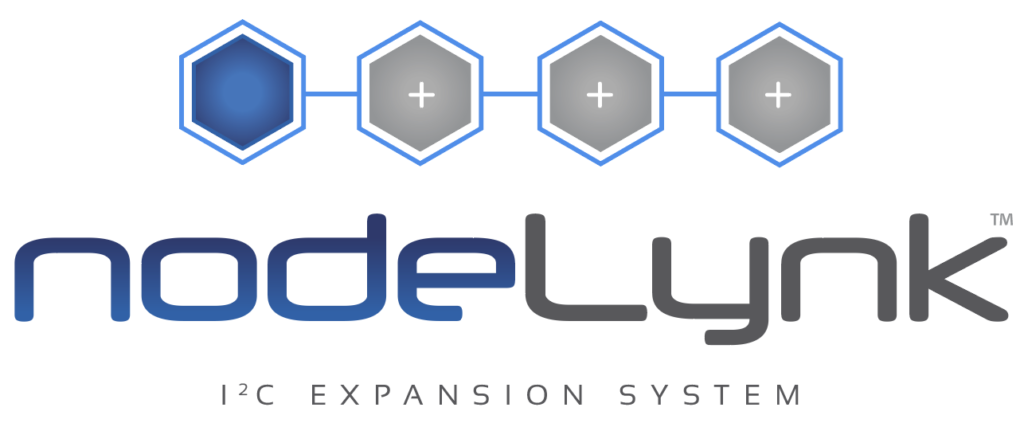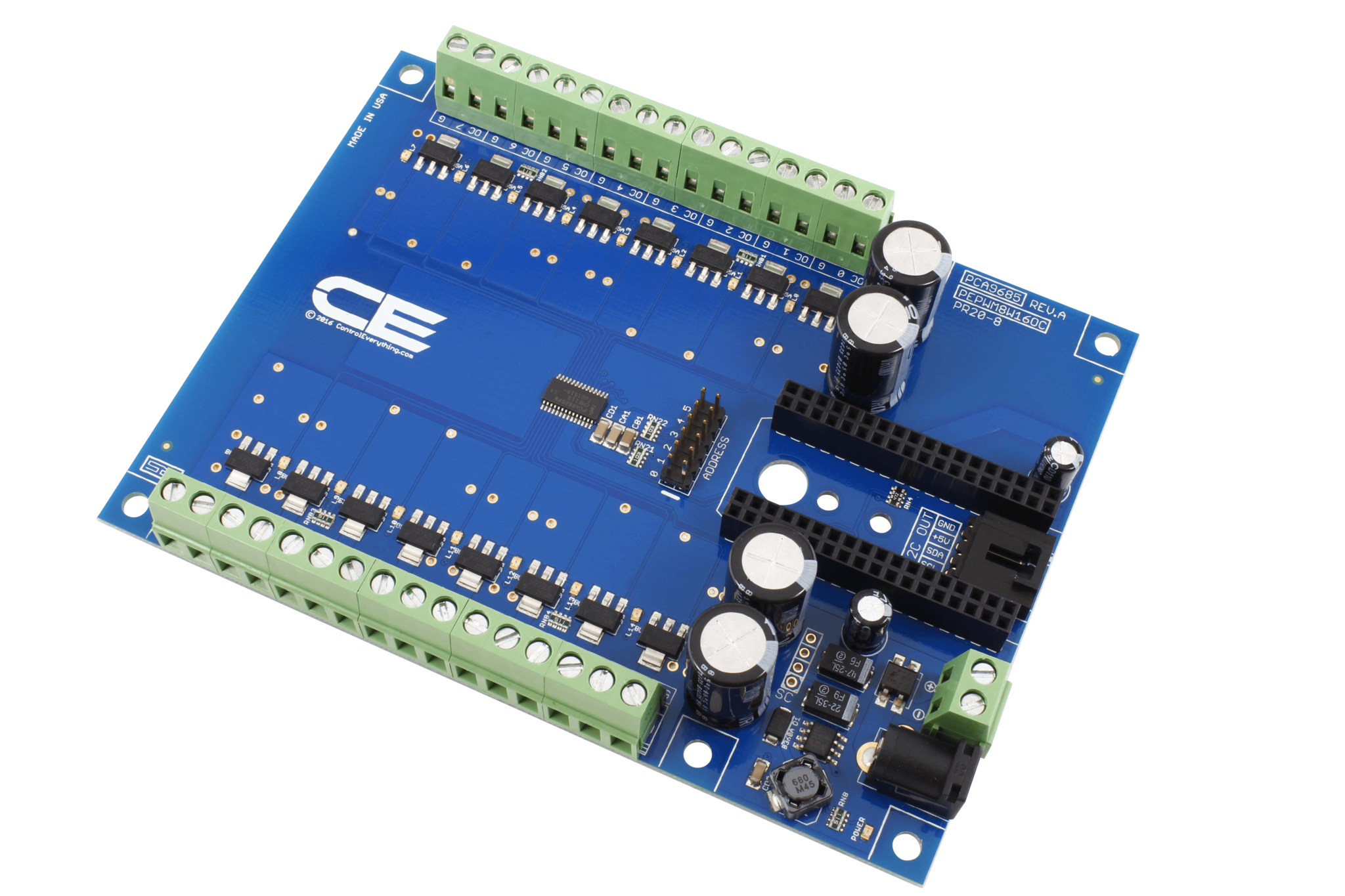PCA9685 16-Channel 8W Open Collector 12-Bit PWM FET Driver with IoT Interface
Highlights
- Power FET Controller Shield with IoT Interface
- Compatible with Particle Photon, Electron, or Bluz
- Adaptable to Arduino, PyCom, Raspberry Pi, Onion and more
- 16 N-Channel PWM Controlled Open Collector BUK98150-55A 55V 5.5A 8W Power Fets
- Solid-State 12-Bit PWM Light Dimming of Incandescent or High-Power LED Lighting
- Designed for Resistive Solid State DC PWM Control Applications
- I2C Expansion Port for Adding External Sensors or Controllers
- PCA9685 12-Bit PWM 16-Channel I2C Interface
- 4096 Levels of Output per Channel
This 16-Channel power FET driver allows 12-Bit variable control of high-current loads your favorite IoT communications technology via I2C communications. This device uses sixteen BUK98150-55A power FETs, allowing cloud control of 16 channels of High-Power LED or incandescent lighting from anywhere in the world. The BUK98150-55A is capable of controlling up to 55VDC and 5.5 Amps of current (8 Watts of Heat Dissipation), making it an ideal choice for most low-voltage DC lighting applications. The PCA9685 chip is used as a driver for this controller, making communications easy and expandable to up to 62 devices on a single I2C port.
What is the NCD IoT Interface?
The NCD IoT Interface provides users with a means of changing or upgrading the IoT communications technology as new technologies emerge. The NCD IoT Interface is directly compatible with Particle Photon for WiFi communications, Electron for Cellular Communications, Bluz for Bluetooth. Optionally, adapters may be installed to provide a direct interface to Arduino Nano, Micro, USB, PyCom WyPy, Onion Omega, Raspberry Pi, and much more. The NCD IoT interface allows you to re-use your hardware so it never becomes obsolete! Based on I2C communications, the NCD IoT Interface uses only 2 GPIO lines of your microcontroller, freeing the rest of your CPU for other tasks.
nodeLynk™ IoT Device Expansion
This is a IoT Device which accepts a common processor and provides on-board sensing or control capabilities. This IoT device may be expanded to include additional hardware functionality using nodeLynk Expansion Devices. The NCD IoT socket found on IoT devices is capable of directly handling NCD ESP8266 and ESP32 series processors as well as Particle Photon and Particle Electron. We also manufacture many adapters for the NCD IoT socket for Arduino Nano, Micro, and Feather microprocessor modules. Between the socket is a nodeLynk connector, which is used for I2C Expansion.


What is nodeLynk?
Chain expansion devices using nodeLynk. Connect a wide variety of accessories to expand the capabilities of a nodeLynk compatible controller. Use nodeLynk to add Relay Controllers, Sensors, PWM Drivers, Displays, and a wide variety of 4-20mA, 0-10V ADCs and DACs, as well as a wide array of TTL & Isolated GPIO devices. All nodeLynk devices use I2C communications to chain devices together. nodeLynk is an easy way to expand functionality without soldering. nodeLynk allows expansion in seconds so you can focus on your software and firmware development.

Unlimited I2C Expansion
Based on our plug-and-play nodeLynk I2C interface standard, all NCD IoT devices are equipped with a nodeLynk I2C expansion port, making it easy to expand to a wide variety of sensors, current monitors, relay controllers, PWM controllers, and much more! We are always designing new nodeLynk expansions for our plug-and-play nodeLynk I2C framework. We are dedicated to building a product line of interconnected devices to simplify all forms of automation. Re-use or upgrade your hardware in seconds by selecting the modules that best fit your needs, and chaining them together using the included nodeLynk I2C expansion cables!
Mechanical Drawing
Wiring Diagrams
Documentation
Datasheets
Official Repository
Integration Notes
This device was designed for proportional control of resistive loads, but may be used for very light inductive applications, such as small hobby DC motors. We strongly encourage customers to use this version with resistive loads as much as possible. This controller is equipped with 16 Open Collector 12-Bit PWM outputs. Open Collector 12-Bit PWM outputs work by connecting an external load, such as a incandescent light or LED to ground under software control. Open Collector 12-Bit PWM outputs are also known as low-side drivers, meaning they connect/disconnect the ground side of an external device. Because the outputs on this controller are open collector, every external load can operate at a different voltage, as long as all voltages are capable of sharing a common ground. See our wiring diagram for connection examples. Not for use with AC power applications. This device requires an external 12VDC Power Supply.
IoT Interface Compatibility
NCD IoT Interface devices are designed to plug in to many popular IoT computing platforms. This allows the “brains” from other manufacturers to directly plug into our devices for easy plug-and-play operation. IoT interface devices use I²C as the underlying communications technology. The notes below will guide you into plugging 3rd party IoT technologies into our devices, we will highlight any adapters that may be required in this section. Please note that all IoT Interface Devices act as a I²C Master Device, and may be expanded by connecting to any of our Cross-Platform nodeLynk I²C Slave Devices using the nodeLynk I²C Output.
NCD IoT Interface Direct Connection
The following devices directly plug into NCD IoT Interface controllers without a adapter.
- Particle Electron
- Particle Photon (Particle.io)
- Bluz Module (Bluz.io)
- ESP8266 Module
If using a Particle Photon or Particle Electron communications module, the PKFR Key Fob Receiver overlay shield may be used to add long-range wireless Key Fob remote control to the communications module.
NCD IoT Interface Adapters
Use the following adapters will adapt the IoT Interface for I2C communications with other popular computing platforms:
- Arduino Nano using the Arduino Nano Adapter
- Arduino Micro using the Arduino Micro Adapter
- Onion Omega 1&2 using the OC Adapter
- Pycom WiPy using the WiPy Adapter
- Pycom WiPy2 & LoPy using LoPy Adapter
- Adafruit Huzzah ESP8266 using the Adafruit Huzzah Adapter
- Windows using USB Interface and the USB IoT Interface Adapter
Convert IoT to I2C Interface Devices
- This device may be converted to an I²C slave device using the I2C to IoT Interface Adapter, ideal for use with Raspberry Pi, Beaglebone, Arduino Uno, and BridgeX5.
Arduino Interface
- Use the I2C to IoT Interface Adapter and a Arduino Uno Interface Adapter
- Use the I2C to IoT Interface Adapter and a Arduino Nano I²C Shield
- Use the I2C to IoT Interface Adapter and plug into any Arduino Nano Master Device
- Use the I2C to IoT Interface Adapter and plug into any Arduino Micro Master Device
- Use the I2C to IoT Interface Adapter and plug into any Arduino Due Master Device
BeagleBone Interface
- Use the I2C to IoT Interface Adapter and a BeagleBone I²C Interface Adapter
Banana Pi Interface
- Use the I2C to IoT Interface Adapter and a Banana Pi I²C Interface Adapter
C.H.I.P. Interface
- Use the I2C to IoT Interface Adapter and a C.H.I.P. I²C Interface Adapter
Raspberry Pi Interface
- Use the I2C to IoT Interface Adapter and a Raspberry Pi I²C Interface Adapter
- Use the I2C to IoT Interface Adapter and a Raspberry Pi 2/3 I²C Interface Adapter
- Use the I2C to IoT Interface Adapter and a Raspberry Pi Zero I²C Interface Adapter
Windows 8/10 PC Interface
- Use the I2C to IoT Interface Adapter and a USB to I2C Converter
- Use the I2C to IoT Interface Adapter and a BridgeX5 Series Controller
Key Fob Compatibility
NCD IoT Interface devices are also compatible with a 418MHz Key Fob receiver (Part Number: PKFR), allowing your Particle Electron, Photon, or Bluz to receive and process remote Key Fob commands up to 750 feet away. Up to 40 remote controls may be associated to the PKFR. Program your IoT communications module to receive wireless remote control commands using a Key Fob. Compatible with 1, 2, 3, 4, 5, and 8-Button MS Series Key Fobs from Linx Technologies.
Out of stock

